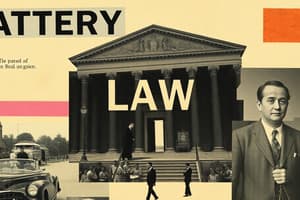Podcast
Questions and Answers
What does shopkeepers privilege allow a shopkeeper to do?
What does shopkeepers privilege allow a shopkeeper to do?
- Arrest a person without any evidence of theft
- Keep someone in the store until they can prove their identity
- Detain someone suspected of vandalism for a reasonable time
- Detain a person they believe has stolen property for investigation (correct)
Under what condition can a false arrest claim not be pursued?
Under what condition can a false arrest claim not be pursued?
- If the plaintiff committed the crime for which they were arrested (correct)
- If the person was detained for more than 24 hours
- If the arresting officer acted without any probable cause
- If the arrest was made in a public space
What constitutes trespass to land?
What constitutes trespass to land?
- Making a complaint about a neighbor's property use
- Entering a neighbor's land for a brief moment
- Throwing an object over a fence onto another's property
- Intentionally entering someone else's land or causing entry (correct)
In the case of trespass to land, what type of damages can a plaintiff seek?
In the case of trespass to land, what type of damages can a plaintiff seek?
What is required for a claim of environmental trespass to land to be valid?
What is required for a claim of environmental trespass to land to be valid?
Which of the following best defines nuisance?
Which of the following best defines nuisance?
What is the key element that establishes trespass to land?
What is the key element that establishes trespass to land?
What remedy is not available in cases of environmental trespass to land?
What remedy is not available in cases of environmental trespass to land?
What is considered harmful contact in the context of battery?
What is considered harmful contact in the context of battery?
Which of the following elements is necessary for an assault allegation?
Which of the following elements is necessary for an assault allegation?
In the context of false imprisonment, which condition must be met for liability to exist?
In the context of false imprisonment, which condition must be met for liability to exist?
What type of damages may be awarded in cases of battery?
What type of damages may be awarded in cases of battery?
Under what condition can deadly force be used in self-defense?
Under what condition can deadly force be used in self-defense?
What is the role of 'apparent ability' in an assault claim?
What is the role of 'apparent ability' in an assault claim?
Which statement about words and false imprisonment is accurate?
Which statement about words and false imprisonment is accurate?
What is NOT a requirement for a property owner to use force against a trespasser?
What is NOT a requirement for a property owner to use force against a trespasser?
In the context of defense of others, when can a defendant intervene?
In the context of defense of others, when can a defendant intervene?
Which of the following best describes the intent required for battery?
Which of the following best describes the intent required for battery?
Which of the following conditions would NOT support a battery claim?
Which of the following conditions would NOT support a battery claim?
Which statement about the use of force in self-defense is correct?
Which statement about the use of force in self-defense is correct?
What is a key limitation when using force for the recovery of chattel?
What is a key limitation when using force for the recovery of chattel?
Which statement accurately reflects the use of force to defend real property?
Which statement accurately reflects the use of force to defend real property?
What type of defense attacks the prima facie case by disputing intent, causation, act, or technical injury?
What type of defense attacks the prima facie case by disputing intent, causation, act, or technical injury?
What must emotional distress do in order to be recoverable in a tort case?
What must emotional distress do in order to be recoverable in a tort case?
What principle does the law prioritize when it comes to property versus human life?
What principle does the law prioritize when it comes to property versus human life?
Which type of consent is shown through specific words or written agreement?
Which type of consent is shown through specific words or written agreement?
Which of the following actions invalidates a claim to self-defense?
Which of the following actions invalidates a claim to self-defense?
Under which condition can recovery for physical injury be allowed in a claim for intentional infliction of emotional distress (IIED)?
Under which condition can recovery for physical injury be allowed in a claim for intentional infliction of emotional distress (IIED)?
Which form of consent can be reasonably inferred from a plaintiff's conduct?
Which form of consent can be reasonably inferred from a plaintiff's conduct?
In which situation is consent considered invalid due to fraud or misrepresentation?
In which situation is consent considered invalid due to fraud or misrepresentation?
What type of defense does a defendant use to prove they had a privilege to commit a tort?
What type of defense does a defendant use to prove they had a privilege to commit a tort?
Which of the following factors is NOT a criterion for implied consent to medical battery?
Which of the following factors is NOT a criterion for implied consent to medical battery?
What is the primary requirement for informed consent according to the Informed Consent Doctrine?
What is the primary requirement for informed consent according to the Informed Consent Doctrine?
How is a 'minimally competent professional' defined in the context of professional standards?
How is a 'minimally competent professional' defined in the context of professional standards?
Which of the following is NOT considered an affirmative defense to the Informed Consent Doctrine?
Which of the following is NOT considered an affirmative defense to the Informed Consent Doctrine?
What role does custom play in determining the standard of care according to the reasonable professional standard?
What role does custom play in determining the standard of care according to the reasonable professional standard?
In the context of a fiduciary relationship, what constitutes a breach of fiduciary duty?
In the context of a fiduciary relationship, what constitutes a breach of fiduciary duty?
What is the significance of expert testimony in establishing the standard of care?
What is the significance of expert testimony in establishing the standard of care?
How does the rule of law relate to negligence law?
How does the rule of law relate to negligence law?
What is the burden of proof on the plaintiff concerning informed consent?
What is the burden of proof on the plaintiff concerning informed consent?
Flashcards are hidden until you start studying
Study Notes
Battery
- Harmful contact includes physical impairment, pain, or illness.
- Offensive contact offends a reasonable sense of personal dignity.
- Contact involves interaction with another's physical body or anything closely associated with it (e.g., clothing).
- Initiates a chain of events leading to harmful or offensive contact.
- Protects individuals from unwanted bodily contact; nominal damages can be awarded.
- Recognizes that some personal contact is inevitable in crowded situations.
Assault
- Defined as intentionally causing apprehension of an imminent battery; no actual touching required.
- A person can experience battery without an assault occurring.
- Mere words are insufficient to establish assault unless accompanied by other circumstances.
- Apparent ability to inflict harm is sufficient; actual capability is not necessary.
- Threats must be imminent, not future, and the plaintiff must be conscious of the threat.
- Aims to protect mental freedom from unwanted touching; nominal damages available.
False Imprisonment
- Involves intentional confinement of a person within defined boundaries set by the defendant.
- Must result in confinement that the individual is aware of or harmed by it.
- A reasonable means of escape negates a false imprisonment claim.
- Protects the individual’s freedom of movement; technical injury is confinement.
- Words can serve as a means of false imprisonment if they induce fear of disregard.
- Damages include actual damages and exemplary damages, along with remittitur.
- Shopkeeper's privilege allows detention for reasonable investigation of suspected theft.
- False arrest claims can arise under the color of law, where conviction serves as a defense.
Trespass to Land
- Defined as intentionally entering or causing entry onto another's real property.
- Liability exists regardless of whether harm to the property is caused.
- Nominal damages are available for trespass, as entry alone constitutes injury.
- Protects possession rather than ownership; scope includes airspace above and sub-surface.
- Can include unauthorized physical interference, like throwing objects onto another's land.
Environmental Trespass to Land
- Involves invisible entry through microscopic particles.
- Requires actual or substantial damages; no nominal damages applicable.
Nuisance
- Requires proof of substantial and unreasonable interference with property enjoyment.
- Harm can be emotional distress, which must manifest physically for recovery.
- No nominal damages; plaintiff must be identifiable to the defendant.
Defenses to Intentional Torts
- Defenses fall into general and affirmative categories; general disputes intent or causation, while affirmatives prove the defendant’s privilege.
- Burden of proof shifts to defendant in affirmative defenses.
Consent
- Validity of consent is established through willingness shown by the plaintiff, which can be explicit or implied.
- Capacity to consent is necessary; consent terms can be limited by context (e.g., sports).
- Implied consent in medical battery applies under specific conditions of incapacity and necessity.
- Consent acquired through fraud or misrepresentation is invalid.
Defense of Self (Self Defense)
- Individuals are privileged to use reasonable force against imminent serious bodily harm.
- The threat must be immediate and the response proportionate.
- Once the threat ends, so does the right to self-defense.
Defense of Others
- Similar to self-defense; applies when intervening to aid someone else in danger.
- Must reasonably believe the other would be justified to use force.
Defense of Real Property
- Property owners may use necessary force against unlawful entry but must demonstrate reasonable belief and prior request for departure.
- Deadly force is not permissible to protect property.
Recovery of Personal Property (Chattel)
- Individuals may use reasonable force to recover chattel immediately after its dispossession.
- Fresh pursuit, demand for return, and reasonable force are the standards.
- Deadly force is not tolerated; human life is valued more than property.
Necessity
- Defense based on reasonable belief in the necessity of actions taken to prevent harm.
- Differentiates between professional standards of care and ordinary conduct standards.
Informed Consent Doctrine (ICD)
- Physicians must provide patients with necessary information regarding treatments and risks.
- Exceptions for common knowledge and emergency situations exist, with burden of proof resting on the plaintiff.
Rule of Law
- Refers to judicial declarations defining specific conduct as constituting duty and breach.
- Rarely employed in negligence law due to its rigidity.
Applying Non-Tort Legislation
- Statutes and regulations can establish duty and breach for non-tort purposes in negligence cases.
Studying That Suits You
Use AI to generate personalized quizzes and flashcards to suit your learning preferences.




